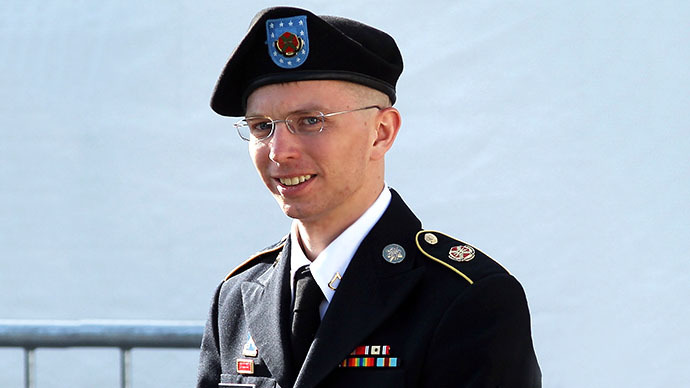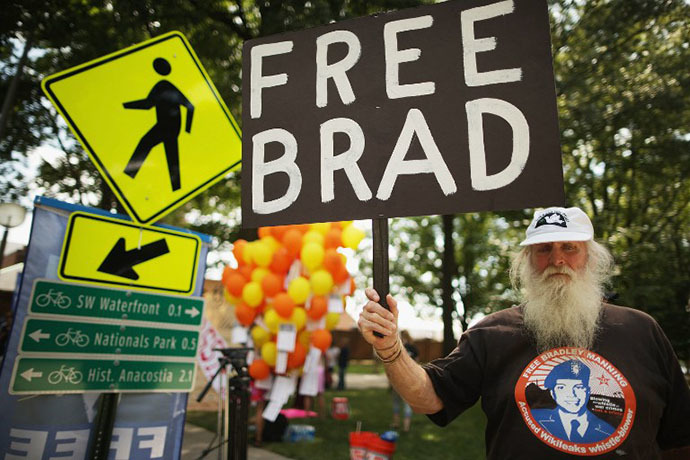Judging Manning: Washington keen on silencing whistleblowers, fears press reaction

The verdict in Manning’s trial depends on the US government’s interest in silencing whistleblowers, but it is unsure how the press will react if Manning is punished too severely, director of the Centre for Investigative Journalism Gavin MacFadyen told RT.
RT:What will be Manning’s punishment in your view?
Gavin Macfadyen: Well, I suspect that the government is
caught in a very difficult place. They’ve invested a great deal
in [Manning’s] prosecution. They have every interest to prevent
other whistleblowers from coming forward. So the punitive aspects
of the sentence will be quite severe, I expect. The compromising
quality however is slightly different. I think they are
probably less keen on what the press will regard as a chilling
effect on them, if by punishing him quite severely. Because he
would have no consequence, if it had not been for the New York
Times, the Guardian, and many European newspapers, in publishing
the most damaging material that he had about the Obama and Bush
administrations.
RT:Why did Manning ask for a military judge rather
than a jury to hear his case?
GM: I don’t know the answer to that, as anybody where I am
would know or not know. I think the problem is that he might have
thought that if he had a group of very patriotic soldiers judging
him that might be a worse result than somebody who might be held
to account as a judge. But I am speculating now; I don’t have any
evidence for that.

RT:Manning’s attorney said he was negligent in releasing the documents but that his client had no evil intent. Is that a mitigating circumstance in this case?
GM: Well, I think what is implied in all that is that he is acting out of his conscience. He had a genuine dislike of what he has been asked to do or what the army was doing in Iraq. He thought that the crimes committed by the army should be made public. And what they’re admitting to is the fact that he broke the law in getting those documents and sending them out to WikiLeaks. The justice of what he did is another matter. I think, in that most people are agreed except those who regard him automatically as a traitor. Most people would agree that indeed, he did it as an act of conscience. Certainly he attempted to publish these documents in the New Your Time’s or Washington Post and other sources, but none of them would do it until WikiLeaks did it. Then they all took up the case. It is a very strong case that nobody would gain from this, certainly not Bradley Manning, who was affectively abused very badly in solitary confinement, so badly abused in fact that a senior State Department official resigned in protest. The fact that the court won’t accept that as evidence of cruel and unusual treatment is to me quite astonishing.
RT:Do you think ultimately he has achieved what he was aiming to achieve by doing all of this?
GM: I think so in large measure. In fact it is actually
true that there were so many documents released that only a
fraction had really been read and studied except by some
academics. They haven’t digested themselves and come out in any
way in which the public can understand a lot of the crime and
corruption and cronyism that characterized those disclosures. So
I think there is a long way to go still before we understand the
consequences of those documents. But the context is clear and I
think he must be very pleased that they have had such an enormous
currency.
RT:Was it all worth it? What has changed since the world found out about US atrocities abroad?
GM: I think that the more people are aware of what
actually happens, the harder will be for ordinary people to
accept those kinds of things. And I think if you a journalist you
always ask what is the effect of the work we do. And I think one
of the effects is the hope that we always hope that we will make
a difference. But we can never guarantee that. I mean, I have
made investigations that didn’t come fully to light for two or
three years then suddenly there is a change in mood, because
people remembered something that they had seen that they didn’t
like. And I think that well may be the case here with Bradley
Manning.
The statements, views and opinions expressed in this column are solely those of the author and do not necessarily represent those of RT.












